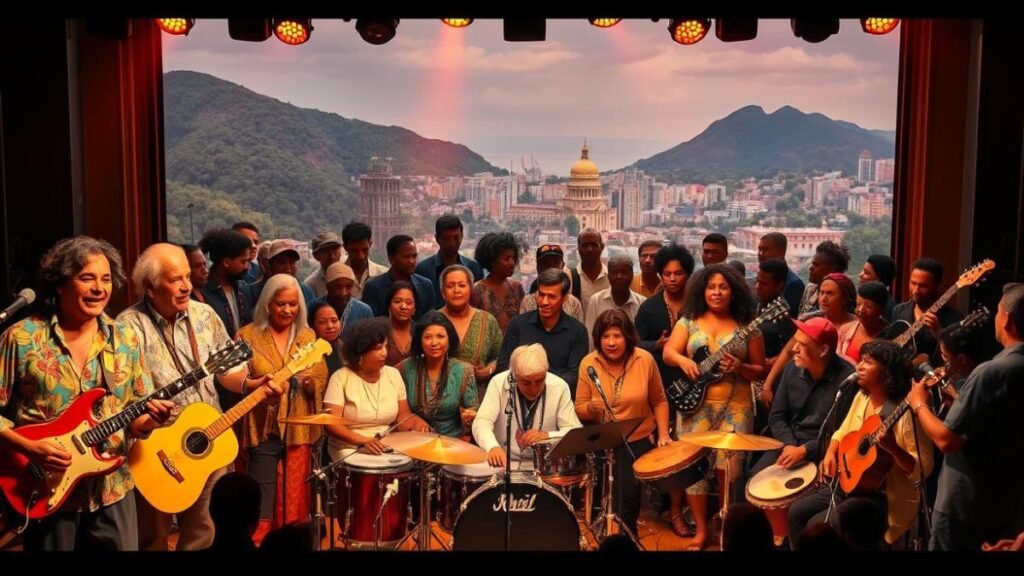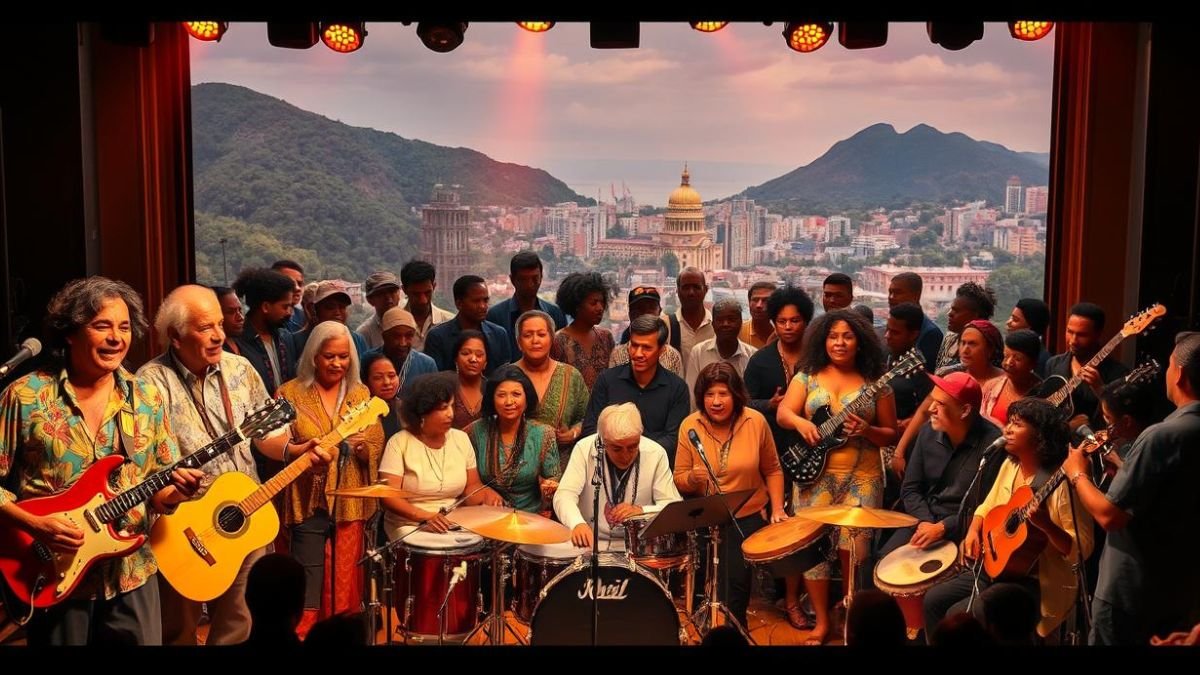Introduction
What if music could transcend borders and unite hearts in ways we never imagined? The legacy of Brazilian musicians reveals just that, proving how legendary Brazilian artists have profoundly shaped the global music influence for decades.
From the sultry rhythms of bossa nova to the vibrant sounds of tropicalismo, Brazil’s rich musical heritage showcases an unmatched blend of cultures and innovations. This article unravels the stories of 10 influential musicians who have not only defined their genres but also redefined the global music landscape.

Key Takeaways
- Brazilian musicians have played a pivotal role in the evolution of global music.
- Legendary Brazilian artists encompass a diverse range of genres, including bossa nova and tropicalismo.
- The fusion of diverse influences creates a unique sound that captivates audiences worldwide.
- Many legendary Brazilian artists have inspired contemporary musicians across genres.
- The impact of Brazilian music continues to resonate globally, shaping musical trends and styles.
The Rich Musical Heritage of Brazil
The musical heritage of Brazil is a vibrant tapestry woven from diverse genres, each contributing to the nation’s identity. Encompassing styles such as samba, bossa nova, and MPB (Música Popular Brasileira), Brazilian music showcases the nation’s diverse cultural influences. Traditional rhythms intermingle with contemporary sounds, creating a unique landscape where innovation thrives.
Artists such as Roberto Carlos and Milton Nascimento have played pivotal roles in shaping this rich musical scene. Their works reflect the deep cultural influences in Brazilian music, showcasing the country’s rich traditions while embracing modernity. As musicians continually explore and blend different styles, Brazil’s musical heritage evolves, enabling new generations to express their creativity.
This dynamic interplay of tradition and innovation enables Brazil to play a pivotal role as a global connector within the music world. The influence of Brazilian music extends far beyond its borders, inspiring artists worldwide. For a more in-depth exploration, visit Brazil’s rich musical culture, and most important.
Understanding Bossa Nova: The Heart of Brazilian Music
Bossa nova represents a pivotal movement in Brazilian music, emerging in the late 1950s as a distinctive blend of samba and jazz influences. Characterized by its smooth melodies and intricate rhythms, this genre captures the essence of Brazilian life while providing a fresh musical perspective. The origins of bossa nova can be traced back to the cultural and social changes in Brazil during this period, reflecting a desire for innovation and modernity.
As bossa nova gained popularity, its sophisticated lyrics and harmonies transformed the global perception of Brazilian music. Artists like João Gilberto and Tom Jobim played significant roles in its evolution, creating a sound that resonated not only within Brazil but also captivated audiences worldwide. Bossa nova became a cultural export that highlighted the beauty and complexity of Brazil, making it a quintessential representation of the nation’s musical landscape.
Tom Jobim: The Father of Bossa Nova
Tom Jobim, a pioneer of bossa nova, revolutionized Brazilian music with his unique blend of harmonic sophistication and emotional depth. His significant songs resonated with audiences worldwide, establishing a lasting legacy. One of his most famous pieces, “The Girl from Ipanema,” showcases his ability to intertwine melodic beauty with poignant lyrics, which continues to inspire musicians worldwide.
Notable Songs and Contributions
Throughout his career, Tom Jobim produced a remarkable catalog of music that defined the bossa nova genre. His compositions often reflect themes of love, nature, and Brazilian culture, making them relatable to a wide audience. Some of his notable works include:
- “The Girl from Ipanema”
- “Corcovado (Quiet Nights of Quiet Stars)”
- “Wave”
- “Desafinado”
Jobim’s innovative approach not only showcased his musical talents but also set a standard for future artists in various genres.
Inspiration and Influence on Future Artists
The musical influence of Tom Jobim extends beyond bossa nova into various styles, inspiring countless musicians throughout the decades. His ability to blend traditional Brazilian rhythms with elements of jazz has paved the way for artists in both Latin and contemporary music. Many contemporary musicians cite him as a primary influence, reflecting his importance in reshaping the musical landscape. Jobim’s work encourages artists to embrace their cultural backgrounds while exploring universal themes, ensuring his legacy continues to evolve.
João Gilberto: The Myth and Pioneer of a Genre
João Gilberto, regarded as a pioneer of bossa nova, revolutionized the Brazilian music scene with his distinctive guitar style and soothing vocal delivery. His contributions to music transformed global perceptions of Brazilian rhythms, embedding bossa nova into the hearts of audiences worldwide.
Defining Bossa Nova Through Guitar and Vocal Skills
With a minimalist yet innovative guitar style, João Gilberto created a sound characterized by soft, intricate rhythms that captivated listeners. His unique approach allowed for the delicate interplay of melody and harmony, blending elements of samba with jazz influences. This combination not only defined the essence of bossa nova but also established the framework for future artists seeking to emulate his distinctive sound.
Impact on the Global Music Scene
Gilberto’s musical impact extends far beyond Brazilian borders. His iconic album “Chega de Saudade” is often credited with marking the onset of bossa nova, showcasing a serene approach to music that struck a chord internationally. Artists across various genres have drawn inspiration from João Gilberto, integrating his style into their own works. This cross-pollination highlights not only his importance as a bossa nova pioneer but also emphasizes the global impact he has had on music over the decades.
Gilberto Gil: The Master of Tropicalismo
Gilberto Gil stands out as a seminal figure in the era of tropicalismo, a movement that significantly reshaped Brazilian music. His ability to blend traditional Brazilian rhythms with rock and global music trends showcases his remarkable musical versatility. Songs like “Aquele Abraço” and the renowned album “Refavela” reflect his innovative approach to songwriting.
Beyond mere entertainment, Gil’s music often examines social issues, revealing a profound cultural influence that resonates deeply within Brazilian society and beyond. Through his work, he captures the essence of Brazil’s rich cultural identity while appealing to a diverse audience. His adaptability to the ever-changing musical landscape highlights the importance of artistic evolution in the realm of music.
Elis Regina: The Immortal Voice of Brazilian Music
Elis Regina stands as an iconic figure in Brazilian music, known for her passionate vocal performances and remarkable stage presence. As a celebrated Brazilian vocalist, she became a defining force in the genre, leaving an enduring legacy that resonates with audiences today.
Powerful Performances that Resound In History
Throughout her career, Elis Regina captivated listeners with heartfelt interpretations of various musical styles. Her performances of songs like “Águas de Março” showcased not only her technical prowess but also an emotional depth that remains unparalleled. Regina’s ability to connect with her audience through her music solidified her status as a cultural icon in Brazil.
Collaboration with Other Legendary Artists
Collaboration played a crucial role in Elis Regina’s artistry. Her partnership with renowned composer Tom Jobim on the album “Elis & Tom” is a prime example of how their combined talents created timeless music that continues to inspire new generations. These collaborations exemplified her versatility and commitment to blending jazz, samba, and bossa nova, further enriching her enduring legacy.
Sergio Mendes: Blending Bossa Nova with Jazz
Sergio Mendes stands as a pioneering force in Brazilian jazz, renowned for his unique ability to blend bossa nova with pop fusion. His groundbreaking sound had a significant impact on the music world, particularly through his influential group, Brasil ’66. This legendary musician brought international attention to Brazilian rhythms, with hits like “Mas Que Nada” introducing vibrant bossa nova melodies to a global audience.
Throughout his extensive career, Mendes showcased an innovative spirit, collaborating with diverse artists across various genres. This adaptability not only reinforced his status as a legendary musician but also enriched the evolving landscape of Brazilian jazz. His partnerships with contemporary figures underscore his commitment to preserving the essence of Brazilian music while incorporating modern influences.
Sergio Mendes continues to inspire new generations of musicians, proving that the fusion of traditional sounds with contemporary styles not only resonates with fans but also creates a dynamic platform for artistic expression. His contributions to pop fusion remain a testament to the versatility and enduring legacy of Brazilian music.
Chico Buarque: The Poet of Music
Chico Buarque stands as one of the most influential voices in Brazilian music, a towering figure known for his remarkable lyrical depth. His work transcends entertainment, merging art with a strong sense of political activism that resonates within Brazilian culture. Through songs like “Construção,” Buarque addresses complex societal issues, crafting a poignant critique wrapped in emotionally charged narratives.
As a multifaceted artist, Chico Buarque’s contributions extend beyond music to include significant works in literature and theater. This diversity enriches his artistry and enhances his impact on Brazilian culture. His ability to weave intricate stories with social commentary influences not only musicians but also writers and activists.
Buarque’s music reflects the struggles and triumphs of the Brazilian people, speaking to their hopes and fears. The lyrical depth found in his compositions makes his songs timeless, offering profound insights that continue to inspire new generations. In a landscape rich with culture, Chico Buarque remains a seminal voice, shaping the dialogue around identity, politics, and art in Brazil.
Anitta: The Rising Star of Contemporary Brazilian Pop
Anitta has emerged as a prominent figure in contemporary pop music, driving the evolution of Brazilian sounds on the global stage. With her unique approach, she masterfully combines various influences, making her a significant player in the global music crossover phenomenon. Her infectious energy and captivating performances have garnered attention not just in Brazil but around the world, establishing her as a pivotal artist in genre-blending.
Impact on International Music Charts
This Brazilian sensation has continuously made waves on international music charts. Anitta’s singles, such as “Bang” and “Envolver,” have climbed the charts, showcasing her talent for creating catchy, danceable tracks that resonate globally. Her collaborations with renowned artists, like J Balvin and Cardi B, have propelled her into the international spotlight, cementing her status as a key player in contemporary pop music.
Blending Genres and Styles
What sets Anitta apart is her ability to blend genres, seamlessly merging reggaeton, funk carioca, and pop elements into her music. This genre blending not only showcases her versatility but also reflects the rich cultural tapestry of Brazil. Anitta’s innovative sound has inspired a new wave of artists, encouraging them to experiment and explore diverse musical styles in their work.

Milton Nascimento: The Voice of Brazilian Folk
Milton Nascimento stands as one of Brazil’s most iconic musicians, renowned for his impressive vocal range and ability to blend diverse musical styles. His contributions have significantly shaped the landscape of Brazilian music, infusing elements of folk music influence, jazz, and MPB into his songs. This rich tapestry of sounds resonates through his critically acclaimed works, particularly the landmark album “Clube da Esquina.” Nascimento’s talent for crafting intricate melodies and harmonies provides listeners with an ethereal music experience that transcends borders.
Influence on Contemporary Brazilian Music
Nascimento’s legacy endures, as he continues to inspire a new generation of artists across diverse genres. The impact of his folk music influence is evident in the works of contemporary musicians, who draw inspiration from his eclectic approach. His songwriting and performances encourage artists to explore their roots while embracing modern styles, resulting in an evolution of Brazil’s musical identity.
Gal Costa: The Divine Voice of Tropicalismo
Gal Costa stands as a pivotal figure in Brazil’s vibrant music history, emerging as a key icon of tropicalismo during the late 1960s. Her contributions blend traditional Brazilian sounds with avant-garde rock, showcasing her remarkable musical versatility. Albums like “Gal Costa” demonstrate her innovative spirit, pushing the boundaries of genre and creativity.
Known for her dynamic performances, Gal Costa mesmerizes audiences with her ability to adapt and explore various musical landscapes. Her fearless artistic exploration not only solidified her role in tropicalismo but also influenced countless artists who followed. This unique ability to navigate diverse styles has made her a central figure in Brazil’s evolving music scene, transcending cultural and musical boundaries.
Gal’s legacy continues to inspire new generations, as her music resonates across ages and boundaries, emphasizing the richness and diversity of Brazil’s artistic expression.
Musicians: A Blend of Culture and Innovation
The vibrant and diverse world of Brazilian music continues to thrive with the emergence of new Brazilian musicians. These artists draw inspiration from the country’s rich cultural heritage while introducing fresh sounds and perspectives. Through their work, they exemplify the beauty of cultural blending and musical innovation, ensuring that the essence of Brazil’s musical landscape remains dynamic and relevant.
New Generations of Artists Carrying the Legacy
Today’s music scene in Brazil showcases an exciting mix of traditional aspects and modern influences. Artists like Maria Rita and Zeca Baleiro exemplify this trend by incorporating elements from folk, samba, and other genres, creating a unique sound that resonates with both local and global audiences. Their commitment to exploring themes related to Brazilian identity and societal issues makes their music both poignant and thought-provoking.
The continual evolution in musical styles reflects how new Brazilian musicians are not only preserving their cultural roots but also pushing boundaries to create something that speaks to contemporary listeners. This rich fusion of sounds and cultural narratives fosters an environment that is ripe for both artistic expression and innovation.

Conclusion
Brazilian musicians have made an indelible mark on both national and international music scenes. Their innovative sounds and styles have not only redefined genres but have also highlighted the rich tapestry of Brazil’s cultural heritage. From the smooth melodies of bossa nova to the vibrant expressions of tropicalismo, these artists have played a pivotal role in shaping the global music landscape.
The impact of Brazilian musicians extends far beyond Brazil’s borders, influencing numerous artists across various genres worldwide. Whether through the pioneering work of legends like Tom Jobim or the contemporary flair of emerging stars like Anitta, the global influence of Brazilian music continues to grow. Their ability to blend various musical elements keeps the essence of Brazilian culture alive and relevant.
As the musical legacy of these iconic figures endures, future generations of musicians draw inspiration from their predecessors. This cycle of creativity and innovation ensures that Brazil remains a powerhouse of artistic excellence, with sounds that will echo through time. The journey of Brazilian music is one that fosters cultural exchange and appreciation, making it a vital part of the world’s diverse musical fabric. Learn more Brazilian.
FAQ
What genres are primarily associated with Brazilian music?
Brazilian music is rich in diversity, prominently featuring genres such as samba, bossa nova, MPB (Música Popular Brasileira), and tropicalismo. Each genre showcases unique rhythms and cultural influences, contributing to Brazil’s vibrant musical landscape.
Who is considered the father of bossa nova?
Tom Jobim, born Carlos Antonio Jobim, is widely regarded as the father of bossa nova. His groundbreaking compositions, including “The Girl from Ipanema,” have been pivotal in establishing the genre’s hallmark of smooth melodies and intricate harmonies.
How did João Gilberto influence bossa nova?
João Gilberto revolutionized bossa nova with his minimalist guitar style and soft vocal delivery. His album “Chega de Saudade” marked the official launch of the genre, introducing a new, calming approach to Brazilian music.
What is tropicalismo, and who are its key figures?
Tropicalismo is a cultural movement that began in the late 1960s, blending Brazilian rhythms with rock and other international styles. Prominent figures include Gilberto Gil and Caetano Veloso, who challenged traditional music through innovative compositions and socially conscious lyrics.
What makes Elis Regina an iconic figure in Brazilian music?
Elis Regina is celebrated for her emotive vocal performances and powerful stage presence. She is known for her collaborations with legendary artists, such as Tom Jobim, which set a high standard for emotional expression in Brazilian music.
How has Sergio Mendes contributed to the globalization of Brazilian music?
Sergio Mendes is renowned for blending bossa nova with jazz and pop, particularly through his band Brasil ’66. His hit “Mas Que Nada” helped introduce Brazilian music to a worldwide audience, showcasing its rhythmic complexity and charm.
What themes are prevalent in Chico Buarque’s music?
Chico Buarque is renowned for his insightful lyrics, which delve into social and political themes. His songs often reflect the cultural and emotional essence of Brazilian society, making him a significant voice in both music and literature.
What impact has Anitta had on the music industry?
Anitta has emerged as a leading figure in contemporary Brazilian pop, renowned for her genre-blending hits, such as “Bang.” Her strategic collaborations and social media savvy have propelled her to international fame, significantly influencing the global pop music scene.
How has Milton Nascimento shaped Brazilian folk music?
Milton Nascimento is renowned for his distinctive voice and eclectic musical style, which seamlessly integrates elements of folk, jazz, and MPB. His album “Clube da Esquina” is particularly influential, displaying complex harmonies that resonate within contemporary Brazilian music.
In what ways did Gal Costa contribute to the music scene?
Gal Costa was a pivotal figure in the tropicalismo movement, known for her dynamic performances and innovative sound. Her fearless exploration of diverse music styles, as exemplified in her self-titled album “Gal Costa,” solidified her legacy in Brazilian music.
How do new Brazilian artists continue to honor their musical heritage?
New generations of Brazilian artists, such as Maria Rita and Zeca Baleiro, are blending traditional and modern styles while exploring cultural themes in their music. This ongoing fusion ensures that Brazilian music remains vibrant and continually evolves while respecting its rich history.




